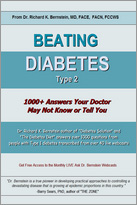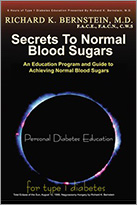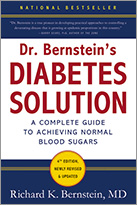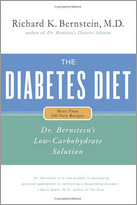SOME WORDS ABOUT ALCOHOL
Alcohol can provide calories, or energy, without directly raising blood sugar, but if you’re an insulin-dependent diabetic, you need to be cautious about drinking. Ethyl alcohol, which is the active ingredient in hard liquor, beer, and wine, has no direct effect on blood sugar because the body does not convert it into glucose. In the case of distilled spirits and very dry wine, the alcohol generally isn’t accompanied by enough carbohydrate to affect your blood sugar very much. For example, 100 proof gin has 83 calories per ounce. These extra calories can increase your weight slightly, but not your blood sugar. Different beers—ales, stouts, and lagers—can have varying amounts of carbohydrate, which is slow enough in its action that if you figure it into your meal plan, it may not raise your blood sugar. Mixed drinks and dessert wines can be loaded with sugar, so they’re best avoided. Exceptions would be a dry martini or mixed drinks that can be made with a sugar-free mixer, such as sugar-free tonic water.
Ethyl alcohol, however, can indirectly lower the blood sugars of some diabetics if consumed at the time of a meal. It does this by partially paralyzing the liver and thereby inhibiting gluconeogenesis so that it can’t convert all the protein of the meal into glucose. For the average adult, this appears to be a significant effect with doses greater than 1.5 ounces of distilled spirits, or one standard shot glass. If you have two 1.5-ounce servings of gin with a meal, your liver’s ability to convert protein into glucose may be impaired. If you’re insulin- dependent and your calculation of how much insulin you’ll require to cover your meal is based on, say, two hot dogs, and those hot dogs don’t get 7.5 percent converted to glucose, the insulin you’ve injected will take your blood sugar too low. You’ll have hypoglycemia, or low blood sugar.
The problem of hypoglycemia itself is a relatively simple matter to correct—you just eat some glucose and your blood sugar will rise. But this gets you into the kind of messy jerking up and down of your blood sugar that can cause problems. It’s best if you can avoid hypo and hyperglycemia (high blood sugar) entirely.
Another problem with alcohol and hypoglycemia is that if you consume much alcohol, you’ll have symptoms typical of both alcohol intoxication and hypoglycemia—light-headedness, confusion, and slurring of speech. The only way you’ll know the cause of your symptoms is if you’ve been monitoring your blood sugar throughout your meal. This is unlikely. So you could find yourself thinking you’ve consumed too much alcohol when in fact your problem is dangerously low blood sugar. In such a situation, it wouldn’t even occur to you to check your blood sugar. Remember, that early blood sugar–measuring device I got was developed in order to help emergency room staffs tell the difference between unconscious alcoholics and unconscious diabetics. Don’t make yourself an unconscious diabetic. A simple oversight could turn fatal.
Many of the symptoms of alcohol intoxication mimic those of ketoacidosis, or the extreme high blood sugar and ketone buildup in the body that can result in diabetic coma. The buildup of ketones causes a diabetic’s breath to have an aroma rather like that of someone who’s been drinking. If you don’t die of severe hypoglycemia, then you might easily die of embarrassment when you come to and your friends are aghast and terrified that the emergency squad had to be called to bring you around.
In small amounts, alcohol is relatively harmless—one glass of dry wine or beer with dinner—but if you’re the type who can’t limit drinking, it’s best to avoid it entirely. For the reasons already discussed, alcohol can be more benign between meals than it is at meals. One benevolent effect of alcohol is that it can enable some diabetics to consume one beer or one bloody Mary (tomato juice mixed with an ounce and a half of vodka) without raising blood sugar.




